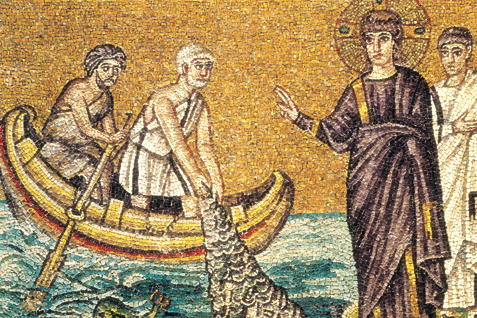I think that all of us have tried to loved our enemies – or at least considered in retrospect occasions we could have or should have. An enemy is by definition someone who does wrong – intentionally or unintentionally. We could still consider someone an enemy even if they don’t directly or indirectly wrong our own person. The Gospel does not command us not to have enemies, because we cannot control other people and make them choose to do good always and everywhere. We become the enemies of others when we act selfishly, we are enemies of God by our sin, the fact that we don’t want to consider anyone an enemy doesn’t mean we don’t have any. Joseph didn’t want to be the enemy of his brothers, David didn’t want to be the enemy of Saul, etc.
Fifteenth Sunday in Ordinary Time
Today’s readings present the mysterious way that God leads us through this life. It says in the Gospel that Jesus “goes out of the house,” just as the sower goes out into the world to sow. Jesus, the Word of God goes out from His intimate dwelling – the Trinity – into the world created through Him and by Him. He is the word He speaks, and when we listen with our hearts He is the seed planted in our soul and the rain that waters it and gives it growth. This image is so positive and full of hope and life. He teaches us through parables that we must take care how we listen and receive His words – our heart is the soil in which the seed (the word) is planted and watered. St. Augustine reminds us that our hearts are all at different times and in different ways these different types of soil. Some days our hearts are the rocky soil – God’s Word bounces off and is scorched in the heat. Some days our hearts are shallow soil – we listen gladly to the word but don’t ponder it so it dies. Some days our hearts are good, but we have surrounded our lives with anxieties and worldly pursuits and experience a kind of suffocation – the little plant of God’s life is suffocating in our hearts. Perhaps this third situation is the one we have to be careful of most as we try to be in the world and not of the world. We will never be fully at home before heaven, so if we try to settle here permanently we will lose our sense of freedom and life.
Saint Andrew, Apostle

It is interesting to see how the apostles respond to Jesus’ call in their lives. St. John shows us the first meeting between Jesus and those He would call. In St. Matthew’s account we see a new movement initiated by Christ. Andrew and Peter were disciples of John the Baptist, and clearly interested in an authentic relationship with God. They were preparing themselves for the coming of the Lord, and St. Andrew had already supposed of Jesus, “Could this be the Messiah?” Jesus is baptised by John in the Jordan, then He withdraws to the desert. What could we suppose Peter, James, John, and Andrew were thinking about during the forty day absence of Christ? What teachings did John the Baptist provide about the Lamb who takes away the sin of the world, the Bridegroom, during Jesus’ absence.

